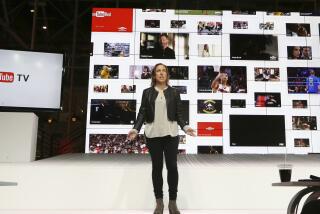Seeing clear advantage in clouds
Google Inc. made waves in the tech world this week when it announced plans to release an operating system called Google Chrome OS that would encourage wider use of something called cloud computing.
Although most have never heard of cloud computing, many do it every day. By uploading photos to Facebook, sending messages via Gmail or playing Club Penguin online, users are accessing programs and software files that are kept far away in cavernous, climate-controlled rooms containing thousands of computers.
Andreas Bechtolsheim, 53, co-founder of Sun Microsystems Inc. -- where he still consults -- knows a thing or two about cloud computing. He’s chief development officer for Arista Networks Inc., a Silicon Valley start-up that supplies networking equipment used to build these massive arrays of computer servers.
He also was one of the first people to invest in Google in 1998 when the company was just two Stanford geeks with a laptop. His $100,000 investment in the company started by Sergey Brin and Larry Page helped turn the Birkenstock-wearing engineer into a billionaire.
In an interview with The Times, Bechtolsheim helped explain this shift in the way we use computers.
--
What do you make of the potential for cloud computing, both as a market and a technology?
It is a surprising evolution in the history of computing. Every application can now shift to the Web. You can access any application remotely. IDC has estimated that by 2012 the market for cloud computing infrastructure will grow to $42 billion, up from $16 billion in 2008. It’s the fastest-growing slice of the spending on information technology. Right now, it’s a small sliver of the overall pie. Most of the spending is for the applications. But it’s a growing slice of the pie.
--
What are some uses of cloud computing?
Hollywood uses high-performance clusters to . . . render movies. The advantage of the cloud is that it’s always running and not idle. They get much better utilization.
These computer farms can simulate car crashes, render movies. Facebook also does an enormous amount of computing behind the scenes to generate relevant content to you. That’s what is going on inside the cloud farms. What you see is just what is relevant to you.
--
As a consumer, what’s the benefit?
You get convenience. You don’t have to deal with servers, data storage or big expensive computers. The laptop accesses everything. You don’t have to worry about backup or security; it’s all being handled by the company that manages the cloud.
--
Who are some of the key players in this space?
The leader is Amazon. They started in the business by renting out their idle servers during non-holiday-shopping seasons. Google provides applications in the cloud. Facebook is a cloud company; they host a number of third-party applications on their cloud.
--
How did your initial investment in Google come about?
I was using the Internet to search for things. Alta Vista was the search engine then, and they had a very simple algorithm. It counted the number of times words appeared in the document.
So people built these dark pages behind the Web page to game the system. As a result, the search results became useless, and doing a high-quality search was impossible. I was just interested in getting better search results. After I heard from Larry and Sergey about their idea, I rushed out to my car to get my checkbook. The company didn’t exist yet. So I wrote them a check and said, “Here’s a check to get you started.”
--
You’ve made a number of smart calls over the years. What do you look for in an investment?
You want to see a viable business plan where it can be profitable over time. In the late 1990s, there were a lot of companies that basically just took an idea for an existing business and put it on the Internet. They took dog food, for example, and sold it online. That wasn’t a very good business model. Whereas Amazon created something completely new.
--
What else?
Simplicity. If an idea makes intuitive sense in the first five minutes, it’s probably a good idea. But the more time it takes to understand, the worse it gets. Google was a very simple idea.
--






